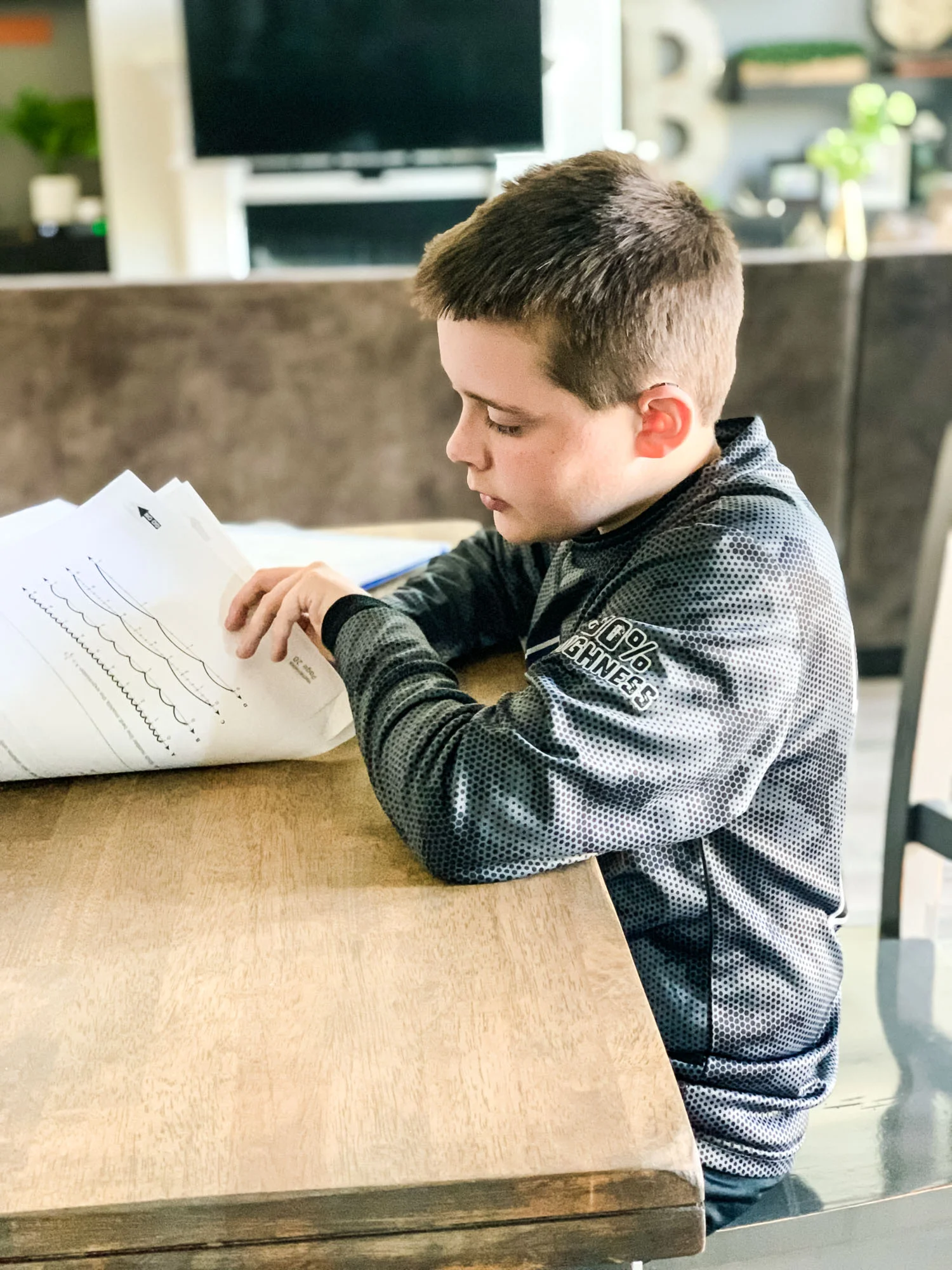Let me start by saying that this is by no means a fool-proof or perfect plan.
In fact, it’s been literally less than 24 hours since there were tears shed over homework at this very table where I currently type these words.
My timing for writing this “how-to” type post is, as usual, (im)perfectly timed with a life occurrence that makes me think the universe is keeping me from getting all cocky by thinking I have all the answers.
This is just a guideline that works as a general rule.
Sometimes it works, sometimes it doesn’t.
It requires that everyone do their own part.
This post contains affiliate links, which means that I will earn a small commission at no additional cost to you if you make a purchase using my links. I only share brands and products I’ve used myself and personally recommend!
1.Have Some Transition Time
Our best success with homework time started when we implemented a 30-minute transition-from-school time. This gives him time to have a snack, chat with me about his day, and sort-of decompress, without giving him too much time to get in full-on relaxation mode.
Set a 30-minute timer and let him do whatever he wants with that time: play outside, watch some TV, even get on his device, if you allow this during the school week.
Once that timer goes off, it’s time to get down to business.
2. Your Student Needs A Paper Planner
Make sure your child has and uses a paper planner (here’s the one we use). This is such an important tool for learning how to manage all the plates they’re juggling.
And they are juggling a lot of plates.
I know there’s a lot of hubbub about how kids are on their devices as soon as they’re home from school, but in a lot of cases, these kids have a lot of other stuff on their plates, in terms of school-related extracurricular activities, and those outside of school, too.
3. Teach your child how to use their planner.
This might seem like it’s self-explanatory, but it isn’t in the least.
Even adults don’t always use their planner or calendar correctly.
Some people write what they did in class that day. Sort-of like a diary. But that’s not helpful unless your kid’s going to write a memoir of her life as a fifth grader.*
Teach her instead to write things that are coming down the pipeline: an upcoming test or project on the date it’s due - a date that is in the future.
Then, depending on how complex the project is or how much studying she’ll need to do for the test, have her write on a couple other dates between now and the test or project due date, indicating that she needs to study or work on his project.
This practice alone will help everyone in the house avoid tears that come from a project that’s been put off until the night before.
4. Check Their Planner Daily
This is especially important at first, when your kiddo is just getting used to using his planner. Check it every day and make sure it has stuff written in it.
Listen, I know that you’re busy and that homework time is the same exact time dinner prep is happening, and the last thing you need is another “to-do,” but it really does only take just a minute or two to ask to see your kid’s planner, look it over, and tell him what to do next.
If there’s nothing written in his planner, it could be that, say, the math teacher hasn’t announced the next test or project, and the class only did math facts that day, in which case, it doesn’t make sense to write something in the Math section that day.
But if every subject area is blank, you should be asking questions.
There’s surely something coming down the pipeline that she should be working on. Not every single day - of course there will be a day here and there that doesn’t have anything written down, but those should be more of the exception than the rule.
SIDEBAR: Do you have a 504 Plan in place for your child? Do you know what that is? If your babe has a medically diagnosed need for accommodations at school - diabetes, asthma, hearing loss, ADHD, dysgraphia, for example - anything that your child may need allowances in order for her to have equal access to an education, you need to look into having a 504 Plan in place. I’ve written a handful of posts on the subject - just do a search on my blog for “504 plan.” I’ve even created a template for you of a document to help you communicate, in more human terms, with your child’s teachers. You can grab that right here.
5. Tidy Up
After checking your child’s planner, have him go through his binder or his take-home folder to clear out graded papers or scratch paper or trash collected during the day.
Clearing out that clutter will help him focus a little more clearly on the homework ahead.
6. Set a Timer
This one’s especially helpful if your kid has ADHD or has homework in a particularly-hated subject.
Set the timer based on how old your child is and take into consideration how severe his focus issues are, and how much hatred he has for the subject.
For example, my son is 11 and we typically set a timer in 15 minute increments.
I suggest starting at 10 minutes if your kid is younger, or allowing for more time if he’s older. You’ll get a feel for what’s the right amount of time for your child after a few days.
This has been great for us because if my son is miserable, he knows he’ll only be miserable for 15 minutes.
What if he’s not finished after 15 minutes?
Let him take a break. Have him do some jumping jacks, lie down and stare at the ceiling for 10 minutes or so, then get him back to business for another 15 minutes.
BUT. Listen up. This part’s important:
I’m a stickler for my kid finishing his homework, and I have no patience for him turning in incomplete work.
BUT I’m also not going to have him sit at his desk for four hours, either.
If, after a reasonable amount of time, he’s still not finished with his homework, and I’ve determined that he’s mentally tapped out, we’ll cry Uncle and put everything away for the night.
Sometimes it’s worth him taking a late grade.
You’ll have to find that sweet spot: that fine line of making your child finish his homework because it’s his responsibility and the flip side, which is knowing when enough is enough for the day.
7. Big Projects
With the assignment sheet in front of both of you, sit down with your child and show her how to work backward from the project’s due date.
By the way, you’ll probably need to do this exercise with her every time there’s a big project assigned in elementary school and probably even into middle school before she can do it on her own.
Take the number of steps in the assignment and divide it out by the number of weeks she has to work on the project before it’s due.
Or lump some steps together, if, for example, she only has three weeks to do a project that has 12 steps. This means she’ll have to complete four of the steps each week for all three weeks.
In addition to having her jot those “mini-deadlines” into her planner, you can also make a checklist on a piece of paper or poster board and stick it on the fridge so it’s visible and sort-of in everyone’s face for the duration of the project.
This way, there’s a constant reminder of the assignment and the steps that are looming over your child’s head.
8. Do not do your child’s homework
Even if she’s just blubbering on and making a big scene about how she “can’t do it,” making you feel all emotional for her.
Even if you’re watching her do it, and you can’t handle the crooked lines or the sloppy glue or what-have-you, and your body’s been hog-tied to keep you from reaching over to yank the pen out of her hand, and grinding out, “Oh for f#*%’s sake, I’ll do it.”
Don’t do it.
Her homework might be the sloppiest, most incorrect assignment turned in, but don’t do it for her.
Her project might be the most hideous one at the science fair, but don’t do it for her.
You aren’t doing your kid any favors by doing her homework for her.
In fact, you’re actually doing far more harm than good because - even though you aren’t saying these words - you are telling her that she’s not capable.
This habit is a real confidence-killer, although some people might disagree when they see their child beaming next to a blue ribbon hanging on the project they did for them. But inside, your child’s got it tucked way deep inside his brain that he couldn’t do it because he wasn’t smart enough/crafty enough/neat enough/blahblahblah, and he’ll refer back to that message next time he’s faced with something “hard.”
9. For subjects your kid hates more than being grounded from Fortnite
As much as it gives me literal pain in my heart, I have come to admit that my son hates nothing more in life than writing.
He hates coming up with words to attach to ideas and feelings he has in his head, and he hates the actual act of holding a pen or pencil and moving it on paper.
Is there a worse hell for me?
I can’t tell you how many full-on emotional meltdowns concerning writing-related homework have happened throughout this child’s life.
I’m afraid that what I’m about to impart to you about any similar situations that might arise with your own child is not going to make you happy.
But it’s just a fact.
And it’s something that you’ll have to share with your sweet baby angel, too.
And it is this:
There are some assignments he is just going to hate more than life itself, and he’ll kick and scream and throw himself in the floor, and you might throw yourself in the floor right alongside him, because it’s just as terrible for you as it is him, but he has to do it.
Practicing these subjects he hates will make him get better at them, even as awful as it is right now.
My child hates writing way less now, as a fifth grader, than he did in his earlier grades, and it’s because he’s had to practice it, even though he’s hated every minute of that practice throughout the years.
Communicate with your child’s teacher and let her know how much your child is struggling with the homework. She might have access to other assignments that teach the same lesson, but that seem more fun or engaging or at least far less murderous for your child.
Or she might suggest your student stay after school to work with her one-on-one or in a tutoring group to get a little more support.
Or it’s possible she can’t offer any help or guidance at all.
And, as much as that might suck at first glance, there is a lesson buried down in there.
The lesson that says, “this is life.”
There will be projects and “assignments” all throughout your child’s life, with some being amazing and others being less appealing and others being just terrible.
But sometimes he won’t have a choice. He’ll have to do it because that’s life.
Hopefully, though, some of these ideas will help you avoid the majority of homework meltdowns.
Do you have any tried-and-true tips to add?
*I say this jokingly, and yet, the more I think about it, I included a pretty nice chunk of my fifth grade school year in my funny memoir, “You Should Write A Book! True Tales of An Unstable Life.” So hey - maybe there’s something to this using-a-planner-as-a-diary thing.













